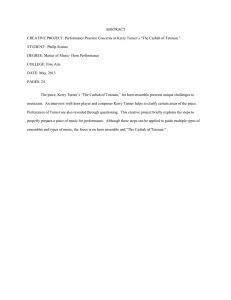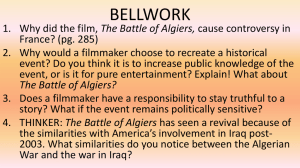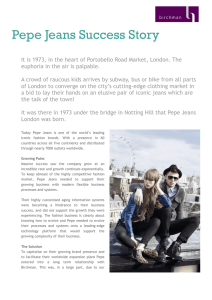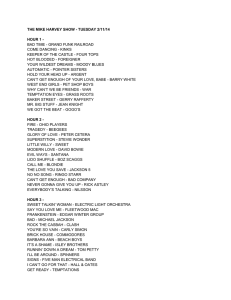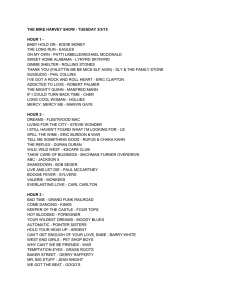MIT Student The City in Film 11.239 5/14/15
advertisement
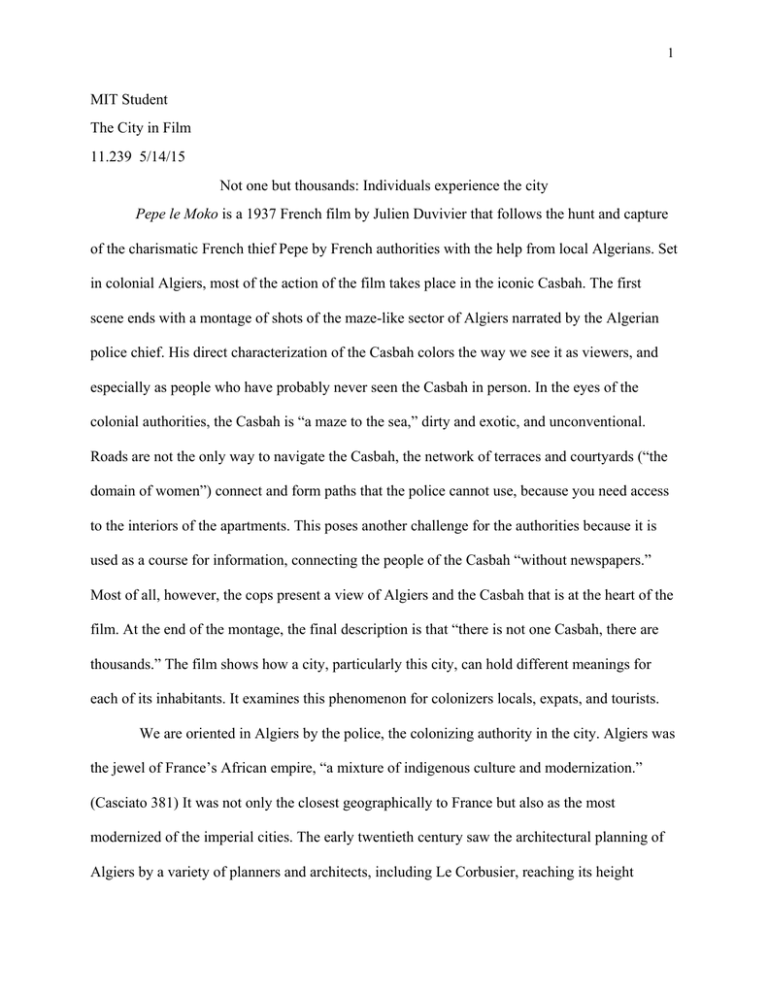
1 MIT Student The City in Film 11.239 5/14/15 Not one but thousands: Individuals experience the city Pepe le Moko is a 1937 French film by Julien Duvivier that follows the hunt and capture of the charismatic French thief Pepe by French authorities with the help from local Algerians. Set in colonial Algiers, most of the action of the film takes place in the iconic Casbah. The first scene ends with a montage of shots of the maze-like sector of Algiers narrated by the Algerian police chief. His direct characterization of the Casbah colors the way we see it as viewers, and especially as people who have probably never seen the Casbah in person. In the eyes of the colonial authorities, the Casbah is “a maze to the sea,” dirty and exotic, and unconventional. Roads are not the only way to navigate the Casbah, the network of terraces and courtyards (“the domain of women”) connect and form paths that the police cannot use, because you need access to the interiors of the apartments. This poses another challenge for the authorities because it is used as a course for information, connecting the people of the Casbah “without newspapers.” Most of all, however, the cops present a view of Algiers and the Casbah that is at the heart of the film. At the end of the montage, the final description is that “there is not one Casbah, there are thousands.” The film shows how a city, particularly this city, can hold different meanings for each of its inhabitants. It examines this phenomenon for colonizers locals, expats, and tourists. We are oriented in Algiers by the police, the colonizing authority in the city. Algiers was the jewel of France’s African empire, “a mixture of indigenous culture and modernization.” (Casciato 381) It was not only the closest geographically to France but also as the most modernized of the imperial cities. The early twentieth century saw the architectural planning of Algiers by a variety of planners and architects, including Le Corbusier, reaching its height 2 around the time Pepe le Moko was made into a film. Their goal was to turn the ancient city of Algiers into a modern capital, and this meant creating buildings and roads that did not meander and weave like those of the Casbah. Interestingly, the Casbah was not changed and remained a lingering pre-colonial enclave, leading the independence movement twenty years later. The European quarter of Algiers is laid out on a planned grid, well defined by roads, while the Casbah appears to be a blended blurry impressionist representation of a city. [1] Using this frame for how Algiers was conceived by the French authority helps us to understand the mentality of the French authorities in Algiers. The Casbah was ultimately something to be conquered; a wild, almost uncivilized yet extremely urban. It seems as though most of what the cops do is try to infiltrate the Casbah and squash the last of the city that has not been fully assimilated into an extension of France. But the architecture and their own view of the Casbah ends up working against them. For instance, when the cops surge into the narrow alley trying to smoke out Pepe, a chain of vagabonds sleeping in doorways carry a warning of their approach by tapping on the doors with their sticks. The cops pay these men no mind; they are filth and vermin of the Casbah. The interior connected terraces of the Casbah that they cannot enter pose another challenge for these foreign entrants. [3] In many ways, these terraces are protected from the colonial power and thus define the Algiers for the colonial authorities: a place they cannot fully infiltrate and modernize. While the French authorities remain out of focus and remote, the local Algerians are brought into sharp focus. They are one of the two groups presented in the film that can move between sectors, crossing the invisible boundary between the Casbah and European Quarter. The role they play utilizes this power; they are all informants to the French authority. The main cast of locals includes [2]: Inspector Slimane, a calculating man working for the cops but also has the 3 complete trust of Pepe’s crew of thieves; Régis, a local who is not as open about his informant status and get killed trying to play the same game as Slimane; Ayrab, another informer who is a pawn in Régis’s plan to get Pepe arrested; and Inés, the female embodiment of the Casbah who plays the same dual role as protector and weakness for Pepe as the Casbah. The locals all have access to the internal network of the Casbah that the cops do not, as well as access points to the social orders of the Casbah, controlled by Pepe and his crew. Slimane has indeed the most power in the whole film as we see him slide all the way from the high class European hotel to the tiny Casbah apartment and look nowhere out of place. Pepe and the other French expats seem to be the people running the Casbah, an interesting foil to the cops who cannot gain any traction it. They may not be colonizing it, but they are still a foreign presence that the local informants reasonably want out of their inner city. Indeed, the cops only come into the Casbah for Pepe, so if he were arrested there would be even less reason for authority to push into the Casbah. Inés, one of the main women of the film embodies the Casbah. She does not straddle the line as much between European and Algerian like Slimane but is much closer to Pepe as essentially his wife. Pepe also directly associates her with the Casbah, and the film associates her role with that of the Casbah; a place/woman he is tired of, always the same and never changing, that will not let him go. In fact, Pepe is very open with his contempt of Inés as he is of the Casbah but she loves him anyways. She never understands why Pepe is dissatisfied with her and the Casbah. When Pepe cries out that he wants to go back, she asks “What did I do?” when it was never her but the Casbah itself. Her final act of loyalty occurs when Pepe is drunk and attempting to leave the Casbah, Inés lies to him to keep in out of the city where the cops have been informed he is coming and lie in wait. Her subterfuge keeps him safe for a time but 4 ultimately backfires because it is the last straw for Pepe’s affinity to the Casbah, and indeed her fidelity to Pepe. At the end, she betrays him to Slimane and Pepe is arrested. There is another theme related to the locals that stems from the power relationship in the colonial city giving advantage to Europeans of all classes and the underlying depiction of the local Algerians just wanting the Europeans out. While they may not have as much social capital, there is a certain exotic wisdom about the local Algerians that the Europeans fall for. Pepe falls for Inés’s trick to keep him in the Casbah, but two other expats, Pierrot (who might be Pepe’s son) and Carlos (a leading member of Pepe’s crew) also fall victim to the Algerian tricks. Régis, in his plan to get Pepe out of the Casbah makes a fake letter from Pierrot’s mother back in France saying she’s come to Algiers because she is ill and wishes to see her son before he dies. Pierrot falls for the bait and leaves the Casbah where he is assumedly shot by the cops. Carlos decides that he is going to leave Algiers once and for all but is betrayed by Ayrab the informer and dies and or is arrested in the city. Neither of these trips outside of the Casbah are shown on screen and remain unclear and in fact the only people we see outside of the Casbah are the locals, the tourists, and Pepe in his final act. Pepe is able to escape capture for a long time because he has the protection of the Casbah. Even Slimane cannot arrest him, as he explains when asked why he can have daily interactions with Pepe without arresting him: it is because Pepe could have him killed immediately. But that power is also what makes the Casbah a prison. In describing the presentation of Algiers in film, Eric Breitbart explains the depiction of the Casbah as a prison: “Algiers as identified with the Casbah, the old city, and depicted as a closed space, a virtual prison from which there is little or no chance of escape—and which offer nothing more than 5 despair or death.” (Breitbart, 164) Indeed every European who exits the Casbah dies, the only control they have over any aspect of their lives lies in the power they have with the Casbah itself. But despite this power that Pepe wields, he longs for Paris. We can imagine the route that brings Pepe to Algiers is the archetype of the expat in a colony, filling the role of “‘déclassé elements,’ legionnaires, bartenders, or petty criminals—who have come to the colony looking for the magic ladder that will permit them to find a place in society denied in the mother country” (Breitbart,165) Pepe is a prime example of the this character, he is an illustrious thief in the Algerian slum but is just a poor carpenter back in Paris. As a result the power and suave he presents is actually hollow; he only has it because he can position himself above the colonized, non-white peoples. Pepe and the other expats rule the Casbah where they would be poor vagabonds in Paris, but only because they have marginally more social power in the French colony. As soon as they leave the Casbah, that power and agency is taken away, especially for Pepe who can be immediately arrested if found outside of the Casbah. For the expat, the Casbah is not just a source power, it is also a prison. They, perhaps illogically, have chosen to make it a prison by yearning for their old life in Paris. As Breitbart says, “Pepe le Moko has been defeated from the outset, not by the police but by his nostalgia for Paris.” He goes on to argue that the Casbah itself is characterized as a prison throughout film set in Algiers, starting with these colonial era films. This is in part because the Europeans depicted in these films are personae non gratae in the mother land, and the colonies are a place where they can go to be wild like the locals. Slimane hints at Pepe’s predestination when he cites the Arabic saying, “It is written,” that Pepe’s fate has already by sealed by virtue of who he is in the Casbah. Tania’s song about the emigrant in New York, who left Paris thinking he was going to become rich and famous but finds himself destitute 6 on the street, echoes not just their lives but the lives of many protagonists of city films. The interesting twist is that they are travelling from city to city, not the country to the city. Unlike characters in the John Simms vein, these are city people who will live this way no matter where they go. Yet there is a preference to where they must live these lives. For the Parisian expats, Paris is the only city they need. They succeed in Algiers, but it would be more meaningful if they could succeed in Paris. This is in stark contrast to the tourists who make the fourth main group of characters in Pepe Le Moko. There are four French tourists: Maxime, a wealthy champagne maker; [4] Gaby, his young mistress; and a young couple they are friends with. We see represented in this group the tourist mentality: an exotic adventure where is does not even matter where you are, and includes the feeling of wanting to back home. You travel to new places so you appreciate home even more. These tourists fear nothing walking around the streets of the Casbah, in part because there are the men (domesticated colonized peoples) like Slimane there to pull them out of danger when it erupts as in the first scene in the Casbah. Gaby is walking back through the neighborhood where the cops are trying to capture Pepe and is pulled into an apartment out of the fire fight by Slimane. There of course, she meets Pepe le Moko himself right after Slimane describes him as the dangerous, charismatic, heartthrob of the Casbah. She becomes the successful gambit to get Pepe out of the Casbah, though by the end she very nearly gives up her high social status and jewels to be with Pepe in the Casbah. Gaby’s power as a temptress stems from her role as the embodiment of Paris, and thus foil to Inés and the Casbah. She is everything that Pepe wants; freedom to move around the city of Algiers and back to Paris. It turns out that they even come from the same neighborhood of Paris, (implying that Gaby is a gold digger) but still willing to give up her success to stay with 7 Pepe. However, there is still the sense that her love with Pepe is nothing more than a vacation romance. Pepe is no longer really French, he is as exotic a native. Gaby sheds no tears for him when Maxime lies and tells her he was shot by the police. There is an interesting parallel in this scene where Inés lies to her lover to prevent him from leaving by telling him Gaby is back at their apartment waiting for him and there is nothing in the European quarter for him. Kleep tells Gaby that Pepe has been shot and there is nothing in the Casbah for her anymore. Gaby however, never figures out that Pepe is alive and there is a tragic sequence at the very end as Pepe, now in custody and up against the bars of the gate watching Gaby’s ship depart, cries her name as the boat horn sounds and she covers her ears, and turns away from Algiers. [5] The young couple, in contrast, never forms the same attachment to Algiers. As their ship departs they are enjoying themselves in the bar, not even joining Gaby for one last look at the Casbah before they leave. Their characters are best defined by conversation they have when they join Gaby for an evening in the Casbah. The man begins talking about how much he loves travelling, because he can imagine himself anywhere else no matter where he is. “Like right now,” he says sitting in a café in the Casbah, “I’m in China!” The couple puts on an “indigenous record” playing Algerian music, but do not like it so much to they put on a jazz record saying “This will be more fun.” This is their subtle colonization; they do not care at all about the place they are and want to make it more like Paris. Combined with the fact that the tourists are meant to represent us the viewers this is telling of the way that the film wants us to view Algiers. This film may be set in Algiers but it is very much a version of Algiers that is not wholly truthful. It is an Algiers with danger that cannot affect the average French tourist, an Algiers that is dirty but not so much that you do not want to go in, an Algiers filled with helpful, servient locals who 8 betray each other and criminals but never the wealthy Europeans, an Algiers you can trust, even if the depiction is perfidious. Pepe le Moko portrays many of the thousand Casbahs but they are idealized and romanticized and simplified version of a complicated city. The French authorities obviously have a goal for Algiers: a place where European can go and not feel as though they are out of Europe. The longing of the Europeans to be back in Paris, whether they live in the Casbah or are just tourists shows that despite their attempts to modernize Algiers, it remains non-European. The film pulls its tragedy from Pepe’s inability to return to home, forced to die in what might as well be the wilderness. It does however present Algiers as the kind of place where you can have an exciting vacation, as the story really occurs because Gaby comes on vacation and disrupts what is happening in the Casbah. Nevertheless, Pepe le Moko is a time capsule for a period of colonial history that is often forgotten, and remembered when viewing later films set in Algiers. They tried to create an Algiers like Pepe’s, but in reality Algiers became a hot spot of revolutionary activity in the middle of the twentieth century. 9 Appendix: Images 1. 2. a. Satellite image of Algiers where there is an obvious difference between Casbah and the rest of the city, even in just this corner of Algiers. a. Inspector Slimane, combining French and Algerian fashion; Inés styled like the Casbah is characterized, dirty and exotic and enigmatic and beautiful. 10 3. 4. 5. a. A shot of the “maze” of the Casbah, as Inés uses the terrace pathway to warn Pepe of the incoming police raid. a. Gaby, the embodiment of Paris glowing in the Casbah before Pepe a. Gaby takes one last look at the Casbah from the deck of the ship 11 b. Pepe yells for Gaby through the fence c. Gaby covers her ears as the boat horn sounds and turns away d. Pepe pulls out small knife from his sleeve to kill himself, and Inés stands by helpless 12 13 Works Citied Breitbart, Eric. "The Invisible Prison: Representing Algiers on Film." Walls of Algiers: Narratives of the City through Text and Image. Ed. Zeynep Çelik, Julia Ann. ClancySmith, and Frances Terpak. Los Angeles: Getty Research Institute, 2009. 161-76. Print. Casciato, Maristella. "Alger. Paysage Urbain Et Architectures." Journal of the Society of Architectural Historians 63.3 (2004): 380-84. Web. 29 Apr. 2015. Pépé Le Moko. Dir. Julien Duvivier. Perf. Jean Gabin. Criterion Collection, 1937. DVD. MIT OpenCourseWare http://ocw.mit.edu 11.139 / 11.239 The City in Film Spring 2015 For information about citing these materials or our Terms of Use, visit: http://ocw.mit.edu/terms.
